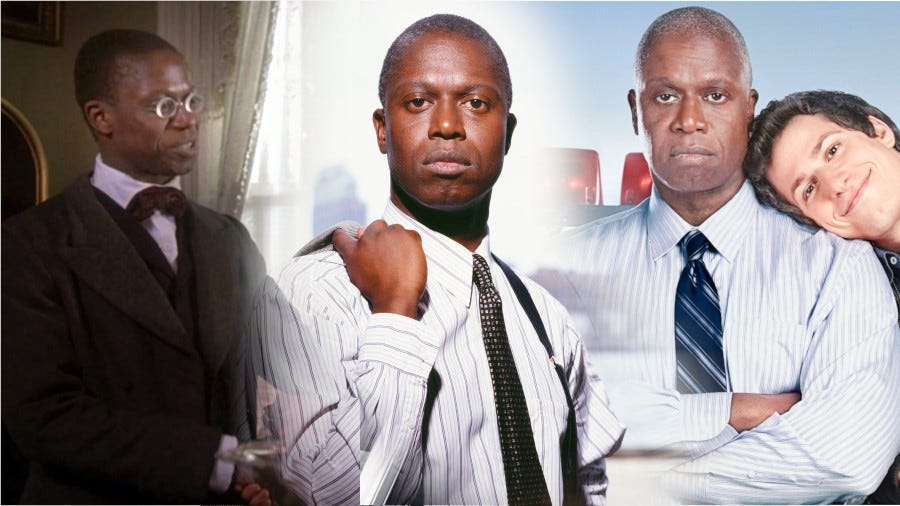Stream On: Rest in peace, Andre Braugher
Andre Braugher, winner of two Primetime Emmy Awards, died on December 11 at the age of 61.
Andre Braugher's first film role was in the 1989 movie Glory as Thomas Searles, an educated Bostonian who joins one of the first black regiments in the Union Army. He subsequently moved on to a major role on the television series Homicide: Life on the Street as Detective Frank Pembleton, a self-righteous, fiery, Jesuit-educated police detective, and recently played gay but stern Captain Raymond Holt on the comedy police series Brooklyn Nine-Nine, about which I’ve written.

One of my favorite actors, Braugher won two Primetime Emmy Awards and was nominated for two Golden Globe Awards. He died on December 11 at the age of 61 from lung cancer (he quit smoking in 2011).
/Amazon /Streaming /🍅95%🍿93% /Trailer /1989 /R
Braugher was never one to play stereotypes: he complained in recent years that a lot of roles offered to him were gang-bangers and the like. In Glory he played Thomas Searles, an intellectual Bostonian born to a free African American family in 1836. Searles was a friend and peer of the historical figure Robert Gould Shaw (Matthew Broderick), a second lieutenant in the 2nd Massachusetts Volunteer Infantry, who, as a captain in 1863, accepted command of the second African American Union regiment, the 54th Massachusetts. (The 1st Kansas Colored Infantry Regiment had been formed in 1862; they also play a part in Glory.)
Searles was an enthusiastic volunteer for the 54th Massachusetts; a bookish type, he was singled out for abuse and ridicule by his fellow volunteers, some of whom were escaped slaves, others farmers; and some of the white troops with whom he came into contact as a private.
None of the volunteers depicted in Glory were historical figures, unlike Shaw; rather, the few that are focused on represented types. Second-billed Denzel Washington (The Book of Eli et al.) played Private Silas Trip, a rough character whose history is starkly evident in the whip scars on his back. Morgan Freeman played Sergeant Major John Rawlins, an ex-gravedigger, who first met Captain Shaw when he retrieved the wounded Shaw from a battlefield. Rawlins’ gravitas made him a natural leader to the disparate troops of the 54th.
Glory twists historic details slightly to tell the big-picture true story of the most celebrated African American regiment in the War Between the States. (All of the commissioned officers were white, like Shaw, in both the 54th Massachusetts and the 1st Kansas.)
It’s an inspirational—and heart-breaking—true tale, based partly on the letters of Captain Shaw to his home, of a major milestone for African Americans in an American war that became about them.
Historian James McPherson told C-SPAN’s Brian Lamb that “Glory accomplished a remarkable feat in sensitizing a lot of today's black students to the role that their ancestors played in the Civil War in winning their own freedom.”
/Amazon /YouTube /🍅91%🍿90% /Video: Pembleton in ‘the box’ /1993 /TV15
On Homicide, Braugher went against Central-Casting type again, playing not a milquetoast Boston intellectual, but a fiery Jesuit-educated Baltimore homicide detective. It’s the first time I saw Andre, and Detective Francis Xavier “Frank” Pembleton remains one of my favorite fictional cops.
Pembleton was a primary character of the show through the first six seasons. Although Homicide featured an exceptional ensemble cast, Pembleton became the fan favorite and is often identified by as the show's signature character. He is based on Baltimore Police Department Detective Harry Edgerton, who, like Pembleton, was an eccentric New York-born African American detective in the BPD homicide unit featured in David Simon's book Homicide: A Year on the Killing Streets.
Homicide: Life on the Street has the feel of a documentary: shot with a jumpy handheld camera, overlapping dialogue almost lost amid background noise, and a lot of tight close-ups, it was a worthy predecessor to The Wire (which was primarily written by David Simon).
In the first episode, a few cases are “caught” with no Pembleton in sight. The detectives are in the break room and they begin talking about the prima donna: “He wears pink ties with polo players on them! He’s a black homicide detective in Baltimore and he wears pink ties with polo players on them!”
When Pembleton drifts into the office, Lieutenant Giardello (Yaphet Kotto) corners him and insists he work with a partner as the rest of the detectives do.
“I don’t work that way, Lieutenant.” Mundane tasks don’t interest the great Frank Pempleton: he forgets to sign in the cruiser he last used, and unfazed, is unable to find it among the dozens in the garage. But in “the box,” the interrogation room, we see the Pembleton magic as he effortlessly obtains a confession from a guilty suspect in the absence of any real evidence.
I haven’t seen the show in twenty years, but I’m rewatching it from the beginning. 91% critics’ score on Rotten Tomatoes.
As of this writing, Homicide: Life on the Street is not currently streaming, although it’s available on DVD and many episodes have been privately uploaded to YouTube—Although Season 1 doesn’t seem to be available in the U.S., a VPN (virtual private network) set to another country (Canada works) will let you watch it.
Pete Hummers is a participant in the Amazon Services LLC Associates Program, an affiliate advertising program designed to earn fees by linking Amazon.com and affiliate sites. This adds nothing to Amazon's prices. This column originally appeared on The Outer Banks Voice.



